- Home
- Brandon Mull
Tales of the Great Beasts Page 3
Tales of the Great Beasts Read online
Page 3
The cassowary was among the largest birds in the world, but it looked to Feliandor almost like a reptile. It stood six feet tall on two powerful scaled legs and weighed in at nearly two hundred pounds. Its feathers were black and stiff — not at all attractive — and its bare head and neck rose serpentlike from the mass of dirty feathers, bright blue, with two red wattles hanging low. Growing from the top of its head was a cracked, bonelike projection that looked much like the horn of a rhinoceros and ran right into its long, sharp beak.
But its head, while intimidating, was not its most deadly feature. Feliandor looked down to its three-toed feet, like huge lizard claws, which each featured a daggerlike talon on the inner toe. This claw was lethal. It could kill a man in the blink of an eye.
Feliandor had always been terrified of this beast. It had a tendency to stare at him from behind its fence, and the flat, golden eyes set in that absurd blue face always made him feel as if the bird was challenging him somehow. Daring him to release it. He imagined it holding his eyes with its own while it lifted its claw to his vulnerable belly. . . .
“So be it!” he chirped now, pulling his eyes away from the monstrous bird. “A fine choice.”
Feliandor drew the vial from his pocket and considered it for a moment. He felt he should say something, that he should somehow mark the occasion. But words failed him, and in the end he simply handed the vial to Jorick.
Jorick too was silent. He nodded, uncorked the stopper, and held the vial to his lips. His eyes found Feliandor’s. In that moment, the young king almost told him to stop, to reconsider. But Feliandor bit back the protest, remaining quiet. Jorick winked once and downed the contents of the vial.
Fel watched the man’s face carefully. Jorick winced, as if tasting something bitter, but otherwise seemed unaffected. He turned to regard the cassowary.
“Well?” Feliandor said when he could bear the silence no longer.
“I think I’d like to open the gate,” Jorick said.
Feliandor handed him the gamekeeper’s key, then took a step back. He looked on as Jorick walked to the gate, unlocked it, and then opened the door. The cassowary still didn’t move, and Feliandor watched Jorick watch it.
“Well?” he said again.
And then, suddenly, chaos. The bird rushed forward, slamming into the half-open door and sending Jorick sprawling back. It hissed, a sound Feliandor had never heard in all his years of coming here. In two great strides the predator closed the gap between itself and the king, and it leaped, clawed talons outstretched. The king stumbled back, bringing up his arms to cover his face and throat, realizing too late that he’d left his stomach exposed. He closed his eyes . . .
And all was silent and still.
Feliandor opened his eyes and let out a short, sudden sob. The bird was gone. Jorick stood by the fence, holding out his arm, and Fel could see the mark on the captain’s hand, a tattoo in the shape of a cassowary. Its long neck wrapped up and around his forearm like a snake.
“My king, I’m so sorry. Are you well?”
Feliandor was shaken, but he smiled. “You called it to its dormant state?”
“I’ve never known it to happen so soon after the partnership is forged.”
“That’s because the bird is not your partner, Jorick.” Feliandor’s smile widened. “It is your slave.”
Feliandor watched as Jorick went through a series of exercises. Mere hours after drinking the Bile, he was already demonstrating the benefits of his bond with the bird. He was faster, stronger; the grace of his movements was breathtaking. His sparring technique had always been impressive, but now he took on a dozen of his best men without missing a beat.
He already seemed to be favoring a two-handed dagger fighting style over the traditional sword technique, as if in imitation of the bird.
It was extraordinary. And it was the solution to all of Feliandor’s problems. If he couldn’t improve Stetriol for the people, then he could improve the people of Stetriol. Make them stronger and tougher. Empower them. And they would love him for it. Finally they would love him as they had his father.
A soldier burst into the room and dropped immediately to one knee. “Forgive the interruption, my liege, but I thought you should know . . . Salen intends to harm the bird.”
Feliandor laughed a short, surprised bark of a laugh. He turned his eyes on the six-foot, blade-clawed predator in the corner. “What, that bird?”
“No, my king,” the soldier said. “The sparrow in the throne room. He has taken it.”
Feliandor hurried through the twisting hallways of the castle, Jorick and a dozen other guards at his heels.
“Go on!” he told Jorick. “Run ahead! You’re faster than any of us now.”
He did, tearing off ahead of them and disappearing into the darkness at the end of the hall, the cassowary at his side. Feliandor experienced a momentary sense of unease as he watched them go. He couldn’t say why; he simply preferred to have that bird where he could keep an eye on it.
But his unease gave way to fury as he closed the distance to the throne room. That sparrow was his only link to his new benefactor. His only link to the Bile. Without it, he was back where he’d started, and all his plans amounted to nothing.
Feliandor crossed the threshold and almost couldn’t believe the scene before him.
There was Salen, on his knees before Jorick. The captain’s face showed such rage, he appeared almost inhuman. He stood menacingly above the old man, who seemed to be in shock and gripped his stomach tightly — as blood spread across his tunic.
The cassowary loomed in the background, Salen’s blood upon its claws.
“Salen!” Fel cried. He ran into the room and dropped to his knees before his adviser, placing his hands over the old man’s own bloodstained fingers, as if he could forcefully fix the tear in the man’s gut. Salen’s wide eyes found Fel’s, but he said nothing.
“Jorick, what’s wrong with you? Guards! Get a healer in here immediately.”
Half of the guards who’d accompanied the king into the room turned and left. Jorick seemed to come back to himself, blinking furiously. “My king, I . . . I don’t know what came over me. I caught him with the bird. He was going to kill it, and I . . . It felt as if I wasn’t in control of my own body. It all happened so quickly.”
Fel gently lowered Salen to the ground, one hand behind the old man’s head and the other still over his torn stomach, providing pressure to stanch the flow of blood.
“You old fool,” Fel hissed. “What possessed you?”
“Trying . . . to protect you.” Salen’s voice was weak, but his eyes were clear.
“I’m not a child anymore, Salen. I don’t need your protection. And you have no right to make decisions that are mine and mine alone.”
Even now, Fel could feel the anger coming back, threatening to overtake him. He hated to see Salen hurt, but it was his own fault. This had been a betrayal. It had been treason.
“Listen,” Salen whispered. “Listen.” And Fel brought his ear down low. “There is a . . . hunger in you,” Salen said. “It drives you. It could . . . drive you to greatness.” He licked his lips. “But appetite in a king can be a terrible thing.”
The healer arrived then, shooing Fel away. He backed off, watching the man work, feeling numb, trying to wipe the blood from his hands. He almost tripped over the birdcage that lay on the floor. The sparrow flitted about inside, unharmed.
“He’ll live,” the healer said. “But he has an unpleasant few months ahead of him.”
“Let’s get him to his bedchamber, men,” Jorick said.
“No,” said Fel. He bent over and opened the little door in the birdcage, and the sparrow flew free, darting immediately out the window and into the night. “Take him to the dungeon,” Fel said. “With the rest of the traitors.”
Two days later, Feliandor stood upon the beach — not the
beach of his native Stetriol, not the beach of his joyful childhood, but a small, misty key in the nearby Hundred Isles. The emissary had called it Nightshade Island.
With the exception of Jorick, he had left his entire entourage behind on the ship. Jorick had rowed the two of them to shore in a small boat, and he stood now, sheltering the king from the wind coming off the water.
“I think you’ll find what you’re looking for in the forest,” Jorick said, indicating the tree line ahead.
“Right,” said Feliandor. “Well, come on, then.”
“No,” said Jorick. Feliandor turned to look at the captain of the guard. There was a flatness to his voice, and an odd quality to his eyes that Feliandor couldn’t remember seeing before. His pupils were dilated into wide black discs, and the flinty captain’s irises shone oddly yellow in the sun. He had called the cassowary to its active state, and it regarded the king with its equally disconcerting gaze. “You must proceed from here alone.”
Somehow it didn’t even occur to Feliandor to argue. He merely clutched his travel cloak to his chin and stepped forward, leaving Jorick alone with his monstrous bird.
The forest was quiet, eerily so after the noisiness of the sea, which the flora somehow dampened. Mist swirled about his feet. What exactly was he meant to find here?
The answer became clear soon enough as he stepped into a clearing. Ahead, there was a dramatic rustling of tree and brush, as if the forest were beset by powerful winds. One tree snapped near its base and fell to the side with a crash. Fel pivoted on his toes as if to run, but he couldn’t tear his eyes away from the swaying canopy and the darkness beyond — darkness that appeared to be moving, writhing like the snakes in Griswald’s sack.
But it wasn’t the darkness that was moving. It was fur, black as night. A huge figure emerged from the depths of the forest. Fel had an immediate impression of its size and little else. His brain worked slowly, piecing together the parts his eyes fell upon as they worked their way up, up: the massive gray fist with its knuckles in the dirt, the ropy muscles beneath matted fur, the cavernous nostrils, and the eyes — eyes that were almost human. Almost.
It was an ape, he realized — a gorilla the size of a castle turret.
And in an instant, Feliandor knew that this was the Great Beast of legend. Kovo.
His breath left his lungs. His hands trembled. And then he did something he’d never done before.
He bowed.
He was on his knees for only a moment before a deep, sonorous voice boomed through the trees — or did it only boom through his head?
“Arise, Feliandor,” said the beast. “I would see you on your feet. For are we not equals?”
Feliandor rose slowly, bringing his head up last of all, raising his eyes to look Kovo in the face. The Great Beast looked ancient, with deep grooves lining his pitch-black features, but his power was unmistakable . . . and humbling.
“Forgive me,” Fel said, “but are we equals? I . . . I never thought to meet —”
“You are among the five most powerful and important humans on the planet,” Kovo said. “I am one of fifteen Great Beasts. By my count, that makes you the rarer and more precious of us two.”
“I . . . If it pleases you, yes.” Feliandor felt like an idiot. He had rested on courtly manners for so long — he had no idea how to act when the rules had fallen away so quickly. And his voice sounded small and weak behind the pounding of his heart.
“It pleases me to please powerful men, my king. And it would please me greatly to ease your burdens.”
“My burdens are . . . are many.”
Kovo’s eyes glinted. “Illuminate me.”
Fel took a steadying breath and then cast about for a moment, looking for props. Finally his eyes settled on one of the many rings he wore. He pried the ring loose and held it up before him.
“Stetriol, my home, is like this gold ring. Rich — beautiful! — all around a circle. But empty on the inside.” He closed one eye to gaze through the ring at the colossal ape. “We can grow no crops within the boundaries of the mountains. The flatlands cannot support our settlements. So the land all along our fertile coast grows cramped and polluted.” Fel’s hands trembled, but not out of fear. The old anger was coming back, and he let it. Anger emboldened him. It made his voice strong, his bearing majestic. “And what happens if enemy ships were to descend upon us?” he continued. “We’d have our backs to the mountains. What happens if a great wave came from the sea to smash us all upon the rocks? My people have nowhere to go.”
He placed the ring back onto his finger. “It is my job as king to imagine such nightmare scenarios and to invent solutions for them. And I am very good at half my job.”
Kovo made a sound in the back of his throat; it almost sounded like purring. “And the Bile? It would somehow ease your burdens?”
“The Bile?”
“It is why you are here, is it not?”
Feliandor nodded. “There is a song my subjects sing in their taverns. When I first heard it quoted, I thought it was in my honor. ‘The good King Fel.’” Fel’s face pinched up and his gaze dropped to the ground. “They’re saying ‘the good king fell.’ My father, the good king, is gone. And now they’re stuck with me.” He grasped for the anger, for the fire in his belly that self-pity threatened to suffocate. “I try so hard,” he seethed, “and I am hated for trying. Hated for the sin of not being my father. So, yes: The Bile is a gift. It could be a great reward to the faithful. It could make my people hardier, better suited to the harsh realities of our land.”
“Perhaps,” Kovo said. “But who decides who is worthy of this gift? You? What if that leads only to further resentment? What if they decided to take the Bile from you?”
“They could try,” Fel growled.
Kovo laughed, and the sound was like thunder. It dashed Fel’s confidence. Here was another situation he was not in control of. What if he had come all this way for nothing?
Then Kovo stepped forward, knuckles first, and Fel’s desperation for the Bile was suddenly the least of his concerns. The Great Beast was near enough to crush Fel with his thumb — perhaps with a sneeze. Kovo’s breath was hot and rank and it filled the space between them, his massive head blocking out the sun entirely.
Fel fought panic, trying to ignore the realization that he had never been in such immediate danger in his entire life. There had been a dozen guards between him and Griswald; here, he was on his own and at Kovo’s mercy.
He held the Great Beast’s eyes.
“Your plight moves me,” said Kovo at last. “It seems altogether unfair. Such a human invention, unfairness. . . . In nature, the strong dominate, the weak fall, and that is that. But in your . . . society, up can so readily become down. Tell me: You are among the five most powerful rulers of your world. Why is it that you should have less than one-fifth of the viable land? Simply due to an accident of birth? It seems to me that you are entitled to more. Just a piece of Nilo, a sliver of Zhong . . . And why not? Would that not be more fair, after all?”
Fel nodded. It hadn’t quite occurred to him in those terms. Neither did it occur to him to question or contradict the creature before him.
“And your land is rich with iron,” Kovo continued. “So rich that your smiths have more than they know what to do with! It seems to me that arming your people would be a natural use for all that iron.”
“My . . . my adviser deemed it unwise to arm the people at a time when they are . . . not content.”
“Oh, my, yes, it would be. But not if they had turned their discontent in a direction of your choosing.”
“I’m sorry. I don’t understand your meaning.”
Kovo smiled, showing incisors nearly as long as Fel was tall. “In all the animal kingdom, it is chimpanzees who are the most like humans. And I have always been fond of both species. Do you know how much you have in common?”
/>
Fel’s mouth was dry, and he forced himself to swallow. He longed to take a step back, but didn’t dare. “We, no, we have no chimpanzees in Stetriol,” he said, and felt immediately stupid. Kovo would know that already.
The Great Beast moved again, circling around Fel, along the edge of the clearing. Fel turned in place, determined to keep his eyes on the beast.
“Chimpanzees use tools to accomplish tasks. They solve puzzles and live together in communities.” Kovo lifted one massive hand from the ground and gently poked at a nest positioned in the branch of a tree. Baby birds chirped from within.
“And when they do not have enough food,” he continued, “they form a raiding party, invade the land of other chimps, and murder their rivals to expand their territory.”
Fel saw it coming a second before it happened. Kovo closed his hand around the nest, crushing it, silencing the birdsong with a single violent gesture.
The king stumbled back, clenching his teeth together. He feared what might happen if he screamed.
After a long moment, Kovo turned to look at him. “Simple, no?”
Fel’s stomach churned. “You . . . you propose we go to war with our neighbors?”
“War is inevitable in your species, I’m afraid,” Kovo purred. “The question is whether your people will go to war with you — for you — or against you. Now, do not look so crestfallen. There is plenty of time to turn things around.”
“My father spoke of war as a great evil.”
“Your father lived in simpler times. That’s not really fair either, if you think about it. He left all of Stetriol’s problems to you. But I come to you now with solutions. Take the land you deserve. Arm your people with iron and steel . . . and this.” Kovo extended the fingers of his other hand, revealing a small vial at the center of his huge black palm.
“Go on,” he said, his eyes glinting again.
Feliandor shuffled forward. He reached out slowly, feeling a great trepidation to be so close to so massive a creature. Somehow Kovo’s human qualities made his inhumanity all the more striking. Kovo acted like a person, spoke like a person . . . but he was something else entirely. And he could crush Fel in his hand as easily as he had crushed those baby birds.

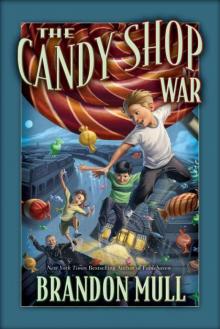 The Candy Shop War
The Candy Shop War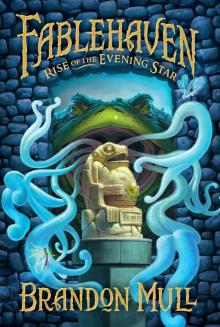 Rise of the Evening Star
Rise of the Evening Star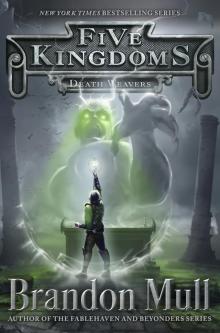 Death Weavers
Death Weavers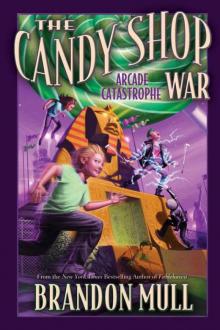 The Candy Shop War, Vol. 2: Arcade Catastrophe
The Candy Shop War, Vol. 2: Arcade Catastrophe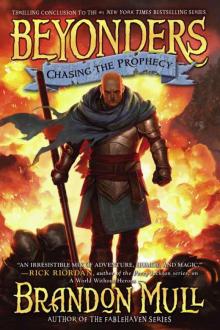 Chasing the Prophecy
Chasing the Prophecy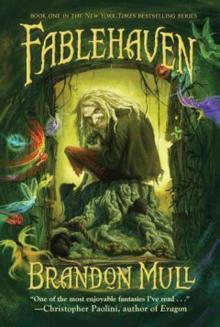 Fablehaven
Fablehaven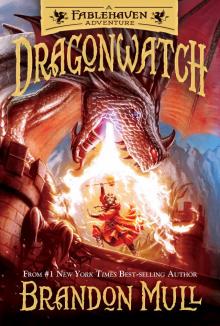 Dragonwatch
Dragonwatch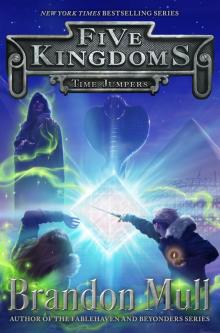 Time Jumpers
Time Jumpers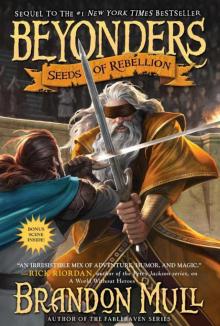 Seeds of Rebellion
Seeds of Rebellion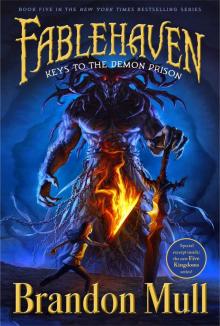 Keys to the Demon Prison
Keys to the Demon Prison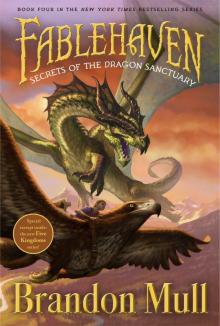 Secrets of the Dragon Sanctuary
Secrets of the Dragon Sanctuary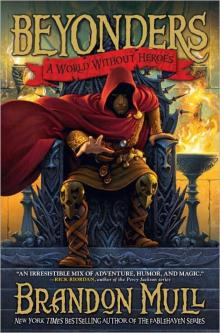 A World Without Heroes
A World Without Heroes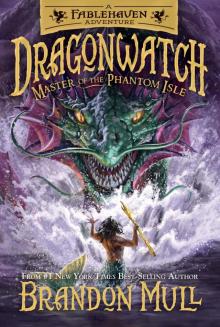 Master of the Phantom Isle
Master of the Phantom Isle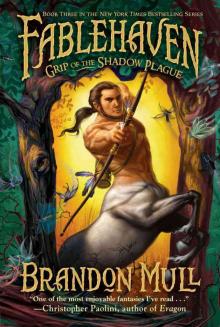 Grip of the Shadow Plague
Grip of the Shadow Plague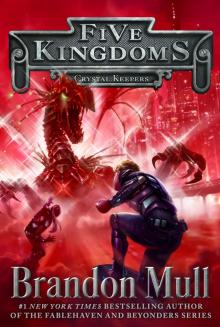 Crystal Keepers
Crystal Keepers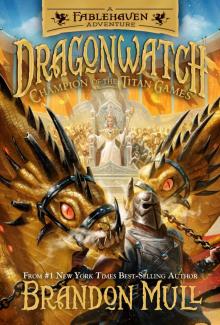 Champion of the Titan Games
Champion of the Titan Games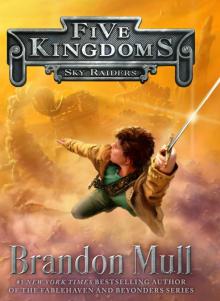 Sky Raiders
Sky Raiders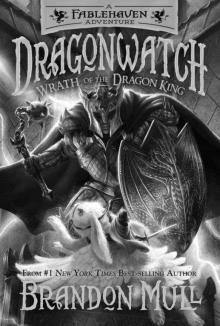 Dragonwatch, Book 2: Wrath of the Dragon King
Dragonwatch, Book 2: Wrath of the Dragon King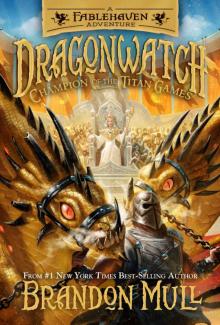 Dragonwatch, vol. 4: Champion of the Titan Games
Dragonwatch, vol. 4: Champion of the Titan Games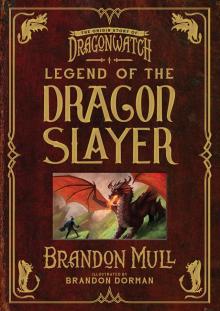 Legend of the Dragon Slayer
Legend of the Dragon Slayer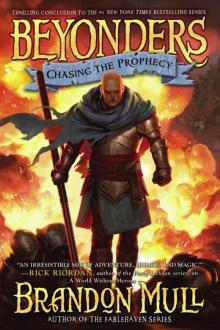 Chasing the Prophecy (Beyonders)
Chasing the Prophecy (Beyonders)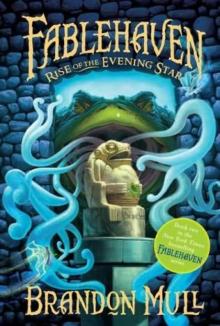 Fablehaven2-Rise of the Evening Star
Fablehaven2-Rise of the Evening Star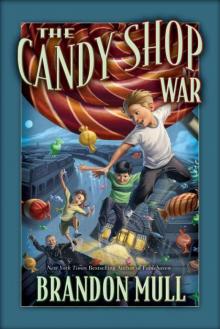 Candy Shop War
Candy Shop War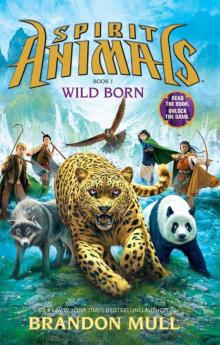 Wild Born
Wild Born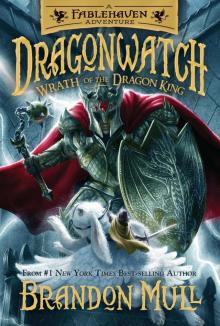 Wrath of the Dragon King
Wrath of the Dragon King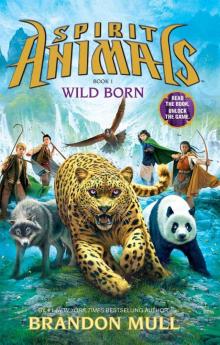 Spirit Animals Book 1: Wild Born
Spirit Animals Book 1: Wild Born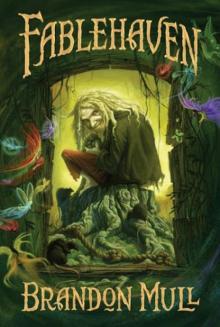 Fablehaven1-Fablehaven
Fablehaven1-Fablehaven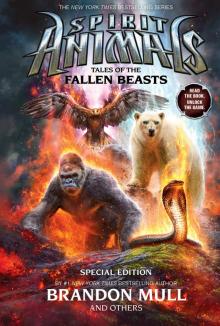 Tales of the Fallen Beasts
Tales of the Fallen Beasts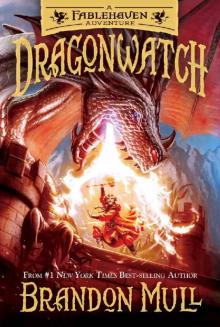 Dragonwatch: A Fablehaven Adventure
Dragonwatch: A Fablehaven Adventure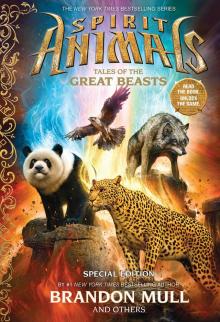 Tales of the Great Beasts
Tales of the Great Beasts